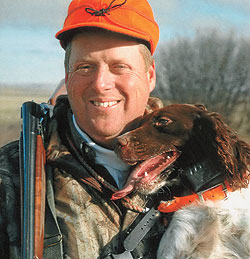By James B. Spencer
 Jim Keller |
"A hardmouthed dog renders birds unfit for the table," Jim Keller said. "When you clean a bird, it shouldn't show punctures, teeth marks, or crushed ribs."
Jim said that hardmouth can be hereditary. If the sire or dam is hardmouthed, the pup will very likely develop this problem. Then he added that this fault is so severely penalized in spaniel field trials and hunting tests that you can usually avoid hereditary hardmouth by selecting a puppy from lines that participate successfully in these sports.
Certain hunting mishaps can lead to hardmouth. Perhaps the most common is retrieving a badly shot-up bird. While retrieving such a bird, even the softest-mouthed spaniel cannot avoid getting a taste of the meat, which seems like raw steak to him. Next thing you know, and predictably, he'll start chewing on it. It doesn't take many such incidents to create a serious hardmouth problem. To a great extent, this is an avoidable problem, in that no one should shoot a bird so close to the gun that it gets badly shot-up.
Jim pointed out that certain trainer errors can lead to hardmouth. One of the most common is what he calls "Happy Mouth." The owner does a lot of play retrieving with his youngster every day because it's fun for both dog and owner. The trouble is, the owner doesn't create any structure for the dog. It's all fun and games. Thus the dog develops a play attitude toward retrieving and starts mouthing the retrieved object on the return, on delivery, or both. This habit can carry over into serious retrieving, which can lead to hardmouth.
"Have fun with your puppy's retrieving," Jim said, "but define a structure. For example, use a retrieve to reward good work in obedience training."
Other trainer errors that can lead to this problem are using retrieving objects that are so soft that they encourage chewing; using objects that squeak when squeezed and thereby encourage biting down; and using soggy dummies and birds.
Jim said that if your dog develops a hardmouth problem, you should stop all retrieving while you fix it. The cure he recommends is what he calls the "conditioned retrieve."
(Others call this training process by several other names, such as "force-fetch," "trained retrieve," and so on). This is a structured program in which the dog learns to hold, pick up, carry, and release various retrieving objects (dumbbell, dummies, and finally birds).
| Preventing Hardmouth | 

Don't miss tips for your pointer, here, or your retriever, here.
|
|
Space doesn't allow a complete description of the conditioned retrieve here. However, through the years, it has been described multiple times in this magazine. Jim pointed out that good basic obedience training is an absolute requirement for this conditioned retrieve program.
He said that an amateur, even a beginner, can successfully train his spaniel in the conditioned retrieve. Many have done so through the years, so if your spaniel develops a hardmouth problem, you should "have a go at it," as they say in Merry Old England, whence our spaniel breeds came. However, if you attempt it and feel at some point that you're making zero progress, perhaps even regressing a bit, Jim recommends that you invoke the assistance of an experienced amateur or professional trainer.
As a final thought, Jim added this: "The conditioned retrieve will minimize the environmental influences of hardmouth, but it won't cure the genetic influences. If your dog's hardmouth is truly hereditary, it will never be completely and finally cured, although the frequency of its occurrences can be reduced and at least partially controlled.
However, no matter what, it will pop up now and then, usually just when you think you've finally cured it."
This tip is from Jim Keller of Wildwind Kennels, 1368 Webb Road, Knox, ME 04986; (207) 322-6236; website www.wildwindkennels.com; e-mail jim@wildwindkennels.com. Jim has been training professionally for 20 years. He trains all sporting breeds for hunting, but specializes in training spaniels for field trials. A regular field trial competitor, he has titled many spaniels in both U.S.A. and Canada. He won the 2006 English Springer Spaniel U.S.A. National Open and has placed in several other national championship trials. He doesn't breed dogs.






